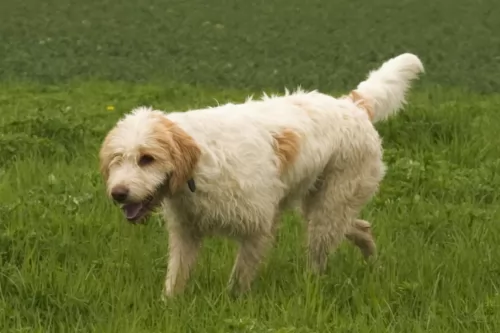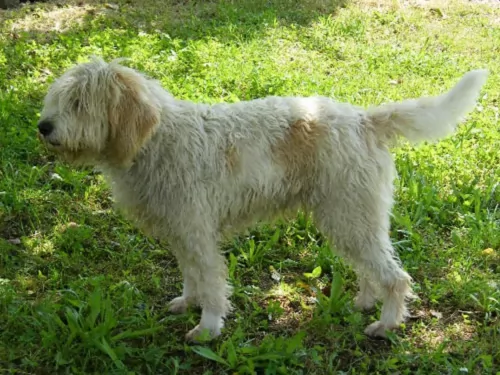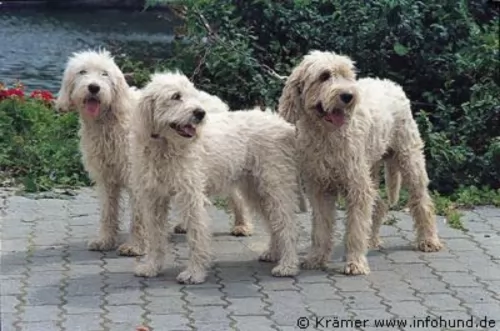 Petzlover
Petzlover Briquet Griffon Vendeen is originated from France but English Setter is originated from United Kingdom. Briquet Griffon Vendeen may grow 14 cm / 5 inches shorter than English Setter. Briquet Griffon Vendeen may weigh 56 kg / 123 pounds lesser than English Setter. Both Briquet Griffon Vendeen and English Setter has almost same life span. Both Briquet Griffon Vendeen and English Setter has almost same litter size. Briquet Griffon Vendeen requires High Maintenance. But English Setter requires Moderate Maintenance
Briquet Griffon Vendeen is originated from France but English Setter is originated from United Kingdom. Briquet Griffon Vendeen may grow 14 cm / 5 inches shorter than English Setter. Briquet Griffon Vendeen may weigh 56 kg / 123 pounds lesser than English Setter. Both Briquet Griffon Vendeen and English Setter has almost same life span. Both Briquet Griffon Vendeen and English Setter has almost same litter size. Briquet Griffon Vendeen requires High Maintenance. But English Setter requires Moderate Maintenance
 The Briquet Griffon Vendeen, a product of France is a hunting down bred down from the Grand Griffon Vendeen. The two dogs are descendants of the Gaul’s Canis sequsius and the Gris de St. Louis hounds. They are one of four dogs with rough coats from the Vendeen area along France’s west coast. Many of these lines were decimated by the Second World War and are still not found in France today.
The Briquet Griffon Vendeen, a product of France is a hunting down bred down from the Grand Griffon Vendeen. The two dogs are descendants of the Gaul’s Canis sequsius and the Gris de St. Louis hounds. They are one of four dogs with rough coats from the Vendeen area along France’s west coast. Many of these lines were decimated by the Second World War and are still not found in France today.
The Briquet Griffon Vendeen survived the war due to a French dog show judge named Hubert Dezamy, who restored the breed and it is mainly a show dog today. Many of Frances royalty prior to the French Revolution favored the breed as show dogs as well. The Briquet was originally developed for hunting of smaller game and is a scent hound. The larger Grand Griffon Vendeen was used in the hunt for large game, namely wolves and boar.
The Briquet Griffon Vendeen is recognized by the UKC and the FCI but not by the AKC and the breed is hardly known outside of France
 The English Setter seems to have been a hunting dog in England as far back as the 15th century. These dogs were known to be ‘setter types’ – hunting dogs that ‘set dogges’ – to set or point at game birds. It is believed that the English Setter is a cross of the Water Spaniel, Spanish Pointer and English Springer Spaniel. In the late 1500’s Sr. Johannes Caius, a sportsman, announced to his friends that there was a new dog our of France for hunting. He then describes an English Setter.
The English Setter seems to have been a hunting dog in England as far back as the 15th century. These dogs were known to be ‘setter types’ – hunting dogs that ‘set dogges’ – to set or point at game birds. It is believed that the English Setter is a cross of the Water Spaniel, Spanish Pointer and English Springer Spaniel. In the late 1500’s Sr. Johannes Caius, a sportsman, announced to his friends that there was a new dog our of France for hunting. He then describes an English Setter.
Then in the early 1800’s Rev. Harrison of Carlise sold a couple of setters to Mr. Laverack. This pair is the foundation for the breed of English Setters. Without really knowing, Laverack claimed that this line he was breeding from had been pure for 35 previous years. He inbred his male and female for many years and did well in confirmation and field trials.
Then in 1874 the first English Setters were imported to the US from this Laverack line. Mr. Llewellin then crossed the best dogs in the Laverack line with his dogs and eventually produced winning champions Armstrong Dash II and Dashing Bondhu. This led to the “Dashing Bondhu” or the Llewellin line of English Setters. This is why the English Setter is sometimes referred to as the Llewelllin or Laverack Setter.
The setter group to which the English setter belongs includes the Irish Setter, the Gordon Setters and the Irish Red and White Setter. The English Setter, as well as the others, were bred to hunt birds such as pheasant and quail. It was the job of the setter to find the prey and point it out to the hunter after it had been shot. They were also used to flush the birds from the brush so that the hunter could then release hawks to take down the prey. The English Setter is methodical and systemic in their approach.
By the 1600’s this working dog had become the breed of the landed gentry and shooting game was their pastime. These nobles did not use hawks to capture the prey but rather shot them after the English Setter flushed them out. The English Setter is very popular today both as a hunting dog and as a family pet. The English Setter is bred for athleticism and endurance. The have both AKC and UKC certification.
 This medium sized dog is stocky and well proportioned. He looks very much like the Grand Griffon Vendeen only smaller. It is less muscular than other hound dogs and it holds its tail up when working. The head is short with a medium/long muzzle. It has low set ears and a flat skull with large, dark eyes and pronounced eyebrows. It also has a mustache.
This medium sized dog is stocky and well proportioned. He looks very much like the Grand Griffon Vendeen only smaller. It is less muscular than other hound dogs and it holds its tail up when working. The head is short with a medium/long muzzle. It has low set ears and a flat skull with large, dark eyes and pronounced eyebrows. It also has a mustache.
 The English Setter is very much a setter in his looks. He is medium in size and was bred to hunt by following airborne prey over a large expanse of ground. He has to have both speed and stamina. He also has to run with his head up watching the prey in the air.
The English Setter is very much a setter in his looks. He is medium in size and was bred to hunt by following airborne prey over a large expanse of ground. He has to have both speed and stamina. He also has to run with his head up watching the prey in the air.
He has a slight dome shaped head and a long muzzle with dark, gentle eyes. The ears have their tips lined up with the eyes, the neck is long and muscular. He shows powerful hindquarters and a fairly long tail.
The coat length is medium and silk. The ears, chest, neck and legs are feathered, as is the tail. The hunting version has a shorter, finer coat than the show dog. The show dogs’ coats are flowing and long. Both types have a white coat with Belton or ticking. The Belton can be black, orange, lemon, liver and the tricolor. This is the liver or blue Belton but there are tan markings on the legs, chest, and face. It was Laverack who named the ticking Belton after a village in England.
 The Briquet Griffon Vendeen is a smart, attentive and sensitive dog. It is easy to train. They are loyal and bond quickly with their owner/trainer. These are enthusiastic dogs with a lot of stamina and get along with dogs and children. They don’t like to be told what to do. They respond well if you bribe them with treats or play with them. They are patient, extroverted and happy dogs.
The Briquet Griffon Vendeen is a smart, attentive and sensitive dog. It is easy to train. They are loyal and bond quickly with their owner/trainer. These are enthusiastic dogs with a lot of stamina and get along with dogs and children. They don’t like to be told what to do. They respond well if you bribe them with treats or play with them. They are patient, extroverted and happy dogs.
 The AKC standard for the English Setter breed describes him as a “Gentleman by Nature” and that might be all you need to know about this delightful dog. They are people-oriented and settle right down with their families if they get enough exercise. With proper stimulation they become couch potatoes when you bring them in at night.
The AKC standard for the English Setter breed describes him as a “Gentleman by Nature” and that might be all you need to know about this delightful dog. They are people-oriented and settle right down with their families if they get enough exercise. With proper stimulation they become couch potatoes when you bring them in at night.
They are very friendly with everyone but are especially happy when playing with children. You can trust them with your other pets, children of all ages and anyone coming to your front door. They are not guard dogs. However, they can have a stubborn streak, they can be strong-willed. This is especially true the more working than show stock they are. In addition, they are intelligent, calm and quiet in the house.
 They are bred to be healthy and hardy, but still have some health concerns. These include:
They are bred to be healthy and hardy, but still have some health concerns. These include:
This is a frightening disease if you find your dog has it. It is characterized by a high fever and an intense hypersensitivity to touch. Aseptic Meningitis is an inflammation of the brain. It is caused by an infection and the most common ones include:
 English Setters, like many other breeds that have a base white coat, can be affected by congenital deafness. A test done by LSU in 2010 showed the 12.4% of the dogs they tested were affected by this. They are also prone to:
English Setters, like many other breeds that have a base white coat, can be affected by congenital deafness. A test done by LSU in 2010 showed the 12.4% of the dogs they tested were affected by this. They are also prone to:
Most of this is caused by autoimmune thyroiditis or a condition where the immune system attacks its own thyroid gland.
The primary cause of death after ten years old
 Don’t overfeed your Briquet Griffon Vendeen. Give her at least 2 meals of high quality dry food – two and one half to three cups daily.
Don’t overfeed your Briquet Griffon Vendeen. Give her at least 2 meals of high quality dry food – two and one half to three cups daily.
Every type of Griffon is a strong hunter and has strong instincts. The Briquet is no different. They need to be able to hunt as this is one of the strongest of scent hounds. They need a fenced in yard at the very least to explore and smell. They also enjoy long walks with new smells. Stay in shape because your Briquet Griffon Vendeen has stamina to share.
They love to play in leu of hunting. The games they love include frisbee, retrieving balls, and learning new tricks. They need mental stimulation as well as physical.
 The English Setter is a hard working dog and should be fed accordingly. Puppies should be fed three times a day and adults twice to avoid bloat. Watch your English Spaniel though as they love to counter surf.
The English Setter is a hard working dog and should be fed accordingly. Puppies should be fed three times a day and adults twice to avoid bloat. Watch your English Spaniel though as they love to counter surf.
In addition to the conditions listed above the English Setter is prone to:
Caused by excessive exercise before or after having eaten a large meal. It is suggested that you feed your English Setter twice a day, smaller meals and not right before or after strenuous exercise.
Keep her ears clean and check regularly for infections.
The English Spaniel needs exercise on a routine basis – every day walks are best along with some time to just run either in a fenced yard or dog park. Take her jogging, running alongside your bike, hiking or just long walks. They do well with lure coursing, agility, confirmation, obedience and rally.